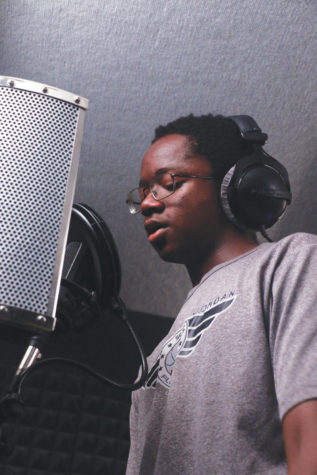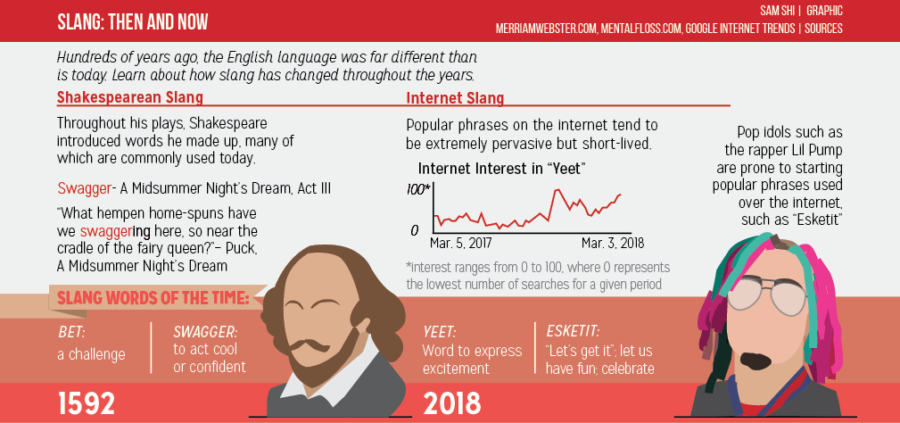Your donation will support the student journalists of Carmel High School - IN. Your contribution will allow us to purchase equipment and cover our annual website hosting costs.
‘Rep Urself’: CHS staff, students reflect on utilization, progression of modern slang
March 23, 2018
With the advent of the Internet, social media and a wider range of mass media, teenagers today are far different from their predecessors. They use new slang words daily, each passing in and out of trends, made up by anyone and everyone who has access to the Internet.
In the past few years, many have criticized teenagers’ utilization of slang words, particularly “text slang.” Some linguists claim it simplifies the rich history of the English language. This claim raises the concern as to whether slang is a natural progression of human language, or just an oversimplified means of communication for teens.
A 2016 study by Kansas State University found that teenagers’ role in language development is overstated as language changes occur throughout a lifetime. The study said teenagers’ current use of slang reflects English as dynamic, alive and manipulated for practicality for the generation that uses it.
Kelly Xiang, Linguistics Club president and junior, said she agrees.
“A lot of people assume slang is watering down English, that it’s not formal. I don’t necessarily think that because we’ve been using slang for thousands of years. A lot of slang in the past has evolved to become part of language today,” she said.
Similarly, etymology teacher Kristin Beeson said, “Language is always evolving, and slang has been a part of language for as far back as I’ve seen. Most of it is fleeting and the slang that you’ll see in one period of time, or within one region, or with one group of people will be different than others. But the fact that humans will want to have a unique, less formal language themselves, that is something that seems to be constant.”

Sophomore Babacar Diatta records a track at the Digital Media Lab. He said the slang he chooses to use in his rap helps build his identity as an artist.
For students like rapper and sophomore Babacar Diatta, slang is a crucial part of daily life used to represent who he is and what he wants to convey. Diatta said the slang he uses and the words he chooses to create himself help build his sense of identity as an artist.
“(Slang) represents the culture rappers come from because a lot of people didn’t come from as fortunate places. Where they’re from, they might not have the best education— there might be ebonics and obviously slang. So they’ll use slang to let people know ‘this is where I’m from and I’m proud of it,’” he said.
Xiang said the use of slang as a unifying device for a sense of identity and development has always been consistent. She said nowadays, with the wider exposure to popular culture, more people will try to reflect what pop idols say.
“A lot more people are aware of (slang) because of pop culture. Right now, a place where we get a lot of our slang from is hip-hop music,” Xiang said. “Whatever they say, we use it in our language. There’s a rhythmic aspect to it, so it sounds cool, but it’s also because we’re so surrounded by it.”
On the other hand, Beeson said counterculture—culture opposite of mainstream society—is also an important aspect of slang nowadays.
“It’s all about that sense of belonging or identity,” she said. “For some people, that’s speaking in a way that’s rebelling from the status quo, while for others it’s about being part of the status.”
Xiang said she believes the biggest shift many have come to criticize is the change in power of local culture to popular culture. She said in the past, local culture would have a greater influence on society, but now, pop culture has a greater influence because of the interconnectedness of the Internet.
“Pop culture is changing where it’s less directed and less controlled. If you have something you’re passionate for and go out for it, you can make it. (Pop culture) used to be where it was (a) very stereotypical kind of celebrity that you’d see because the media would control it,” Diatta said. “But as we’ve progressed, we now see that, if people at their house, on Twitter, on Youtube, listen to your stuff, listen to your music, you can go all the way. There’s less control, there’s no ‘gatekeeper’ so to say, it’s a lot more free (for) anybody.”
For students who use slang regularly like Diatta, slang represents creativity, practicality and identity.
He said, “Everyone’s just making their own slang— it’s you, it’s your identity, it’s be whoever you want to be, there’s no really streamed stereotyped that there used to be. If you’re making up your own words, if you’re saying what you want to say, using the slang you want to use, people will, a lot of times, feel the vibe and it’s a lot more likable and reflective of you.”
